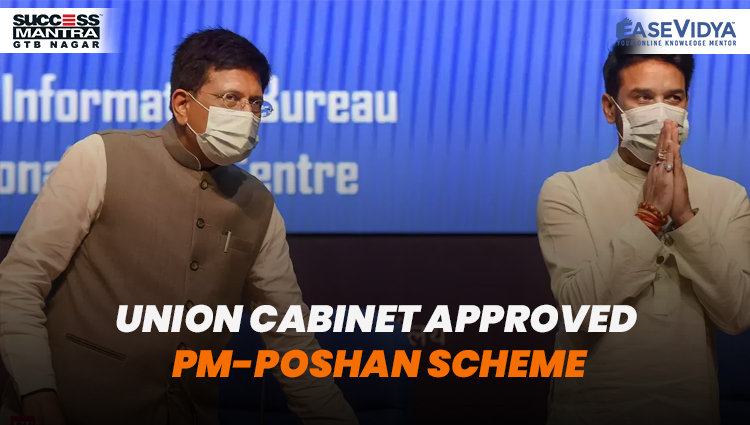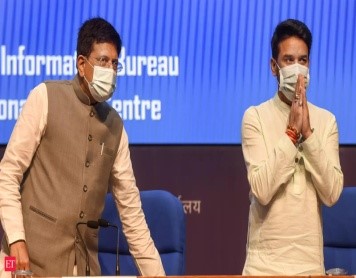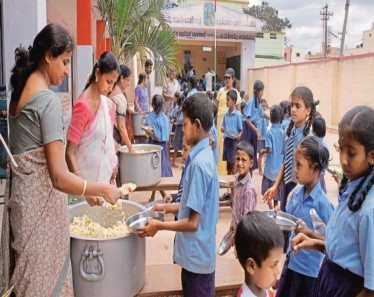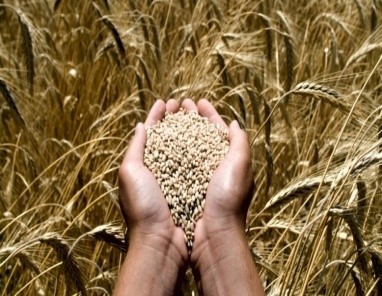
UNION CABINET APPROVED PM POSHAN SCHEME
UNION CABINET APPROVED PM-POSHAN SCHEME
Recently, the Union Cabinet has approved the Prime Minister POSHAN scheme or PM- POSHAN for providing one hot cooked meal in Government and Government-aided schools. The scheme will replace the existing national programme for mid-day meal in schools or Mid-day Meal Scheme. It has been launched for an initial period of five years (2021-22 to 2025-26).

Current Affairs Notes By Success Mantra Coaching Institute GTB Nagar Delhi CLICK HERE
MID-DAY MEAL SCHEME
The Mid-day Meal Scheme (under the Ministry of Education) is a centrally sponsored scheme which was launched in 1995. It is considered as the world’s largest school meal programme aimed to attain the goal of universalization of primary education. Provides cooked meals to every child within the age group of six to fourteen years studying in classes I to VIII who enrolls and attends the school. If the Mid-Day Meal is not provided in school on any school day due to non-availability of food grains or any other reason, the State Government shall pay food security allowance by 15th of the succeeding month.
ALL ABOUT PM POSHAN SCHEME
- Coverage: The scheme will cover 11.8 crore students enrolled in classes 1 to 8 in over 11.2 lakh schools across the country. Primary (1-5) and upper primary (6-8) schoolchildren are currently entitled to 100 grams and 150 grams of food grains per working day each, to ensure a minimum of 700 calories. The scheme will be extended to students studying in pre-primary or Bal-vatikas running in government and government aided primary schools. Balvatika is the pre-school that was started in government schools last year to include children aged younger than six years in the formal education system.
- Nutritional Gardens: The government will promote nutritional gardens in schools. The gardens are being provided to offer additional micro-nutrients to students.

- Supplementary Nutrition: The new scheme has a provision for supplementary nutrition for children in aspirational districts and those with high prevalence of anaemia. It does away with the restriction on the part of the Centre to provide funds only for wheat, rice, pulses and vegetables. Currently, if a state decides to add any component like milk or eggs to the menu, the Centre does not bear the additional cost. Now that restriction has been lifted.
- Nutrition Expert: A nutrition expert is to be appointed in each school whose responsibility is to ensure that health aspects such as Body Mass Index (BMI), weight and haemoglobin levels are addressed.
- Fund Sharing: The Centre will bear Rs. 54,061 crore of the total estimated cost of Rs 1.3 lakh crore, with the states paying Rs 31,733 crore (Rs 45,000 crore will be released by the Centre as subsidies for food grains).
- Vocal for Local for Aatmanirbhar Bharat: Involvement of Farmers Producer Organizations (FPO) and Women Self Help Groups in implementation of the scheme will be encouraged. Use of locally grown traditional food items for a fillip to local economic growth will be encouraged.
CHALLENGES ASSOCIATED WITH IT
- Meeting Nutrition Targets: As per the Global Nutrition Report 2020, India is among 88 countries that are likely to miss global nutrition targets by 2025.
- Serious ‘Hunger’ Level: India has been ranked at 94 among 107 countries in the Global Hunger Index (GHI) 2020. India has a level of hunger that is “serious”
- Menace of Malnutrition: According to the National Family Health Survey-5, several states across the country have reversed course and recorded worsening levels of child malnutrition. India is home to about 30% of the world’s stunted children and nearly 50% of severely wasted children under the age of five.
- Others: Corrupt practices and Caste Bias and Discrimination in serving food.
RELATED GOVERNMENT SCHEMES
Anaemia Mukt Bharat(AMB): It has been launched in the year 2018 as part of the Intensified National Iron Plus Initiative (NIPI) Program for accelerating the annual rate of decline of anaemia from one to three percentage points. The target groups for AMB are Children 6-59 months, 5-9 years, Adolescent Girls & Boys of 10-19 years, Women of Reproductive Age (15-49 years), Pregnant Women and Lactating Mothers.
National Food Security Act, 2013: The basic concept of food security globally is to ensure that all people, at all times, should get access to the basic food for their active and healthy life and is characterized by availability, access, utilization and stability of food. Food security can also be derived from the fundamental right to life enshrined in Article 21 of the Constitution, as it may be interpreted to include the right to live with human dignity, which may include the right to food and other basic necessities. In pursuance of this, the enactment of the National Food Security Act, (NFSA) 2013 marks a paradigm shift in the approach to food security from welfare to the rights-based approach. The Act legally entitled up to 75% of the rural population and 50% of the urban population to receive subsidized foodgrains under the Targeted Public Distribution System.

Pradhan Mantri Matru Vandana Yojana: Pradhan Mantri Matru Vandana Yojana (PMMVY) is a maternity benefit programme being implemented in all districts of the country with effect from 1st January, 2017. It is a centrally sponsored scheme being executed by the Ministry of Women and Child Development.
Target Beneficiaries: All Pregnant Women and Lactating Mothers (PW&LM), excluding those who are in regular employment with the Central Government or the State Governments or PSUs or those who are in receipt of similar benefits under any law for the time being in force.
PRAVAHINI Current Affairs Notes By Success Mantra Coaching Institute GTB Nagar Delhi CLICK HERE
TEST YOURSELF
Q.1 Which of the following schemes will replace the existing national programme for mid-day meal in schools or Mid-day Meal Scheme?
- PM-POSHAN scheme: ANSWER
- Pradhan Mantri Matru Vandana Yojana
- Nutrition Abhiyan 2.0
- None of the above
Q.2 The Mid-day Meal Scheme is a centrally sponsored scheme & was launched in 1995 under which of the following Ministries?
- Ministry of Health & Family Welfare
- Ministry of Women & Child Development
- Ministry of Education: ANSWER
- All of the above
Q.3 Consider the given statements & state which of the following is/are correct in the reference to the above mentioned passage?
- The new scheme has a provision for supplementary nutrition for children in aspirational districts and those with high prevalence of anaemia.
- The scheme aims for providing one hot cooked meal in Government and Government-aided schools.
- Only I follows
- Only II follows
- Both I & II follows: ANSWER
- None of the following
Q.4 Pradhan Mantri Matru Vandana Yojana (PMMVY) which is a maternity benefit programme is a centrally sponsored scheme & being executed by the __________?
- Ministry of Health & Family Welfare
- Ministry of Women & Child Development: ANSWER
- Ministry of Education
- None of the above
Q.5 What is the India's rank in the Global Hunger Index 2020 in which data were assessed for the 132 countries and GHI scores were calculated for only 107 countries?
- 76TH Rank
- 85TH Rank
- 91ST Rank
- 94TH Rank: ANSWER












0 Comment